MJ Nebreda is partying with her demons
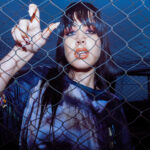
In this Spanglish interview, the Venezuelan-Peruvian musician and producer talks about non-binary identity, making emotional songs to throw it back to, and new release Corazón Club Vol. 1.
WRITER, SET DESIGN AND STYLIST E.R. PULGAR
PHOTOGRAPHER ROY FREIHA
FASHION MANCHADO
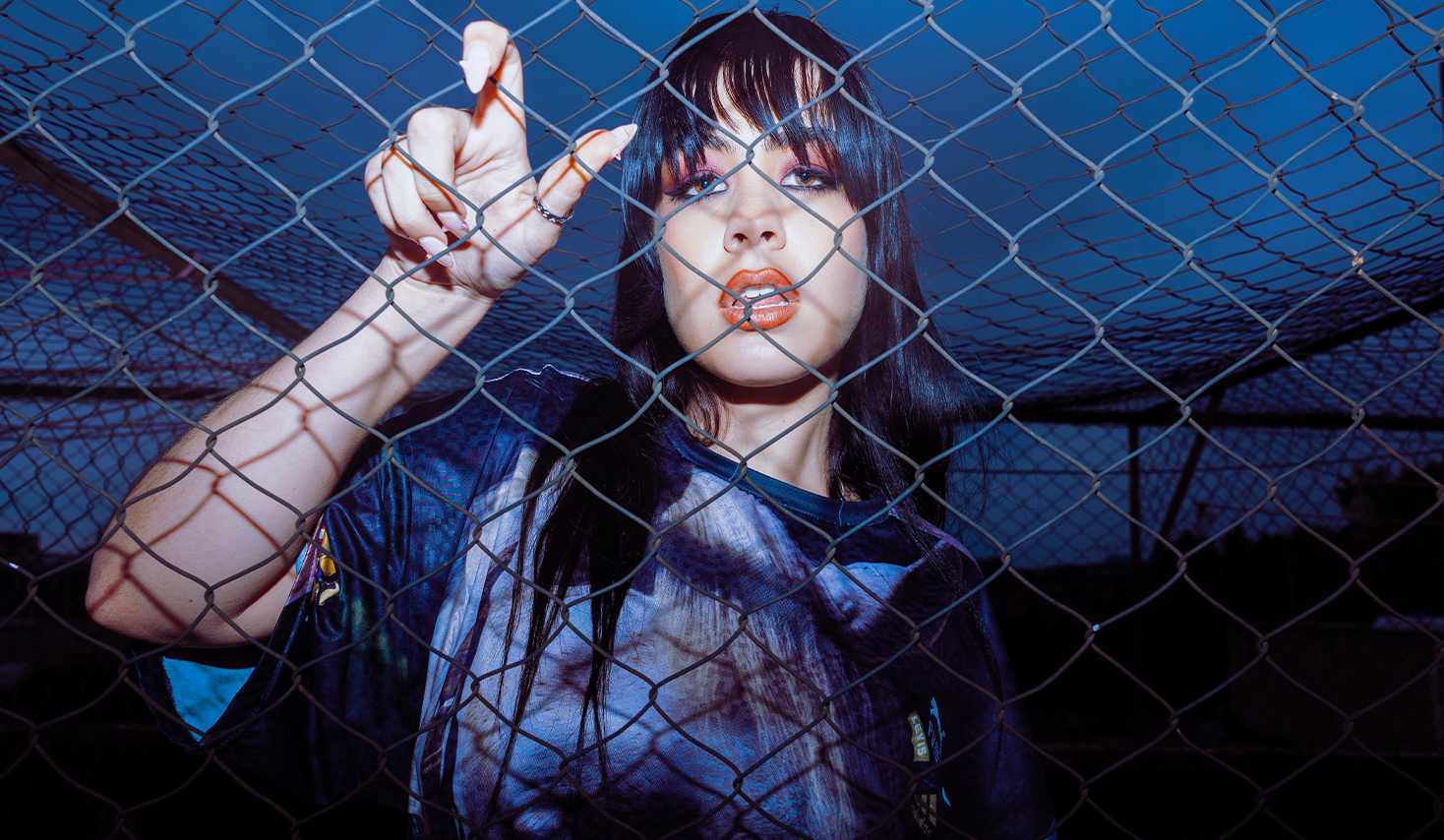
When MJ Nebreda arrives at my Mexico City apartment, I’m immediately struck by their cascading black hair. With the cover of her last release Arepa Mixtape in my mind – where she’s laying on a bed of plantain leaves channelling an hallaca (a traditional Venezuelan Christmas dish) covered in avocados, flowers, and, yes, arepas – I would have imagined her with a flaming red mane à la Riot!-era Hayley Williams.
“It’s a new era, and it’s giving goth bitch,” they say, bubbly and joking as we settle into photos. The goth bitch of it all becomes evident as our rooftop shoot goes on under the greying late-afternoon sky, photographer using the last rays of sunlight as they glint faintly off Nebreda’s black-as-night Rick Owens Kriester visors.
The Venezuelan-Peruvian musician and producer had a late night. Around 1:30AM the day of our interview, she was headlining the 34th edition of CDMX perreo party Goteo. Nebreda, who is based in Miami, has made a name for themself with an approach to the dance floor as emotive as it is worthy of raving all night long. Her unabashedly horny, vibrant, and genre-fluid approach to music has reached a global audience across the far reaches of the diaspora, from several hometown sets at Miami’s iii Points Festival to the previous night’s packed Mexico City set and the decks of Paris-based neoperreo collective Misantropical.


“Siempre empiezo con el beat primero. I don’t really sit down and then I’m like: ‘I want to write a song about esto’; “I’m more like, ‘¿qué me salió?’” she tells me in the Spanglish typical of Miami natives. “Me analizo a mí misma, and then I go to the studio. There are so many emotions to talk about. I’m very driven by intuition, rather than formula.”
Nebreda’s forthcoming mixtape Corazón Club, Vol. 1, throws all of these emotions and influences in a pot and melds them into a layered fondue. Out mid-November, the nine-track record further cements their status as an essential player of new Latin electronic music. The mixtape, which implies the existence of another Corazón Club iteration in the near future, sees Nebreda curate together contemporaries in the Latin Club scene like Venezuelan electronica’s lord of darkness Safety Trance (eerie goth perreo “Tu Me Das”), TraTraTraxx associate Bitter Babe (cheeky bop “Organic”, which samples Calle 13’s “Atrevete Te Te”), and Latin Core founder CRRDR (erotically-charged single “Soy Sentimental”) to hardcore perreo OGs like Puertorriocan MC Kelvin El Sacamostro (hyperactive party-starter “Puta Romantica”).
Corazón Club, Vol. 1 stretches itself across filthy reggaeton, breakbeat, raptor house, and moving reflections on heartbreak and belonging. A self-proclaimed “hypersensitive Cancer with ADHD,” Nebreda’s emotional extremes are as present as the sonic ones on her latest. Jungle-inspired emotional storm “Tormenta” reflects on the end of a relationship, while “Así Nací” nods to their Venezuelan roots and the feeling of inability a lot of Venezuelans in the diaspora have watching our country’s ongoing political, social, and economic struggle. Nebreda is grappling with the eternal themes, but she doesn’t let their weight impede her from throwing it back – a “perrear y llorar” approach at the core of a lot of what might be considered Latin Club, where even the baddest baddie in the room can let her guard down safely.
“Siento que en Corazón Club, you get to understand a bit more why I am the way I am. I can’t help it but be an emotional person who has crushes and gets hurt and cries and loves and laughs and wants friends and wants everyone,” they say. “I want all the things that every single fucking human wants. I don’t want to live en un mundo donde yo tengo que ser la máxima perra, la que no le importa nada. Fuck anything anyone has to tell me about how I have to be in front of anyone I like.”
The aesthetic compass Nebreda has followed has always played at the intersection of masc and femme. Donning a unibrow for earlier releases –“I wanted to be a Venezuelan classic ‘niño de casa con uniceja’”, they joke – Nebreda, who uses she and they pronouns interchangeably, found respite from societal expectations through an in-between gender presentation. They’re in a proud tradition of contemporary queer Latinx femmes in the scene – including Venezuelan electronic icon Arca and Catia-born upstart Yajaira La Beyaca – shifting paradigms in sound and in the ways their music is presented.
When asked to imagine Corazón Club as the physical space it implies, Nebreda is quick to discuss her music as being for everyone, without judging “a type of look” or “any one type of bitch.” They conceptualise electronica as utopia, and their music as a safe haven for all. The idea of the club as sanctuary isn’t a new one, but the positive perspective under it – a pushback against the constant sadness caused by the state of the world, from Gaza to Caracas – means everything to Nebreda.
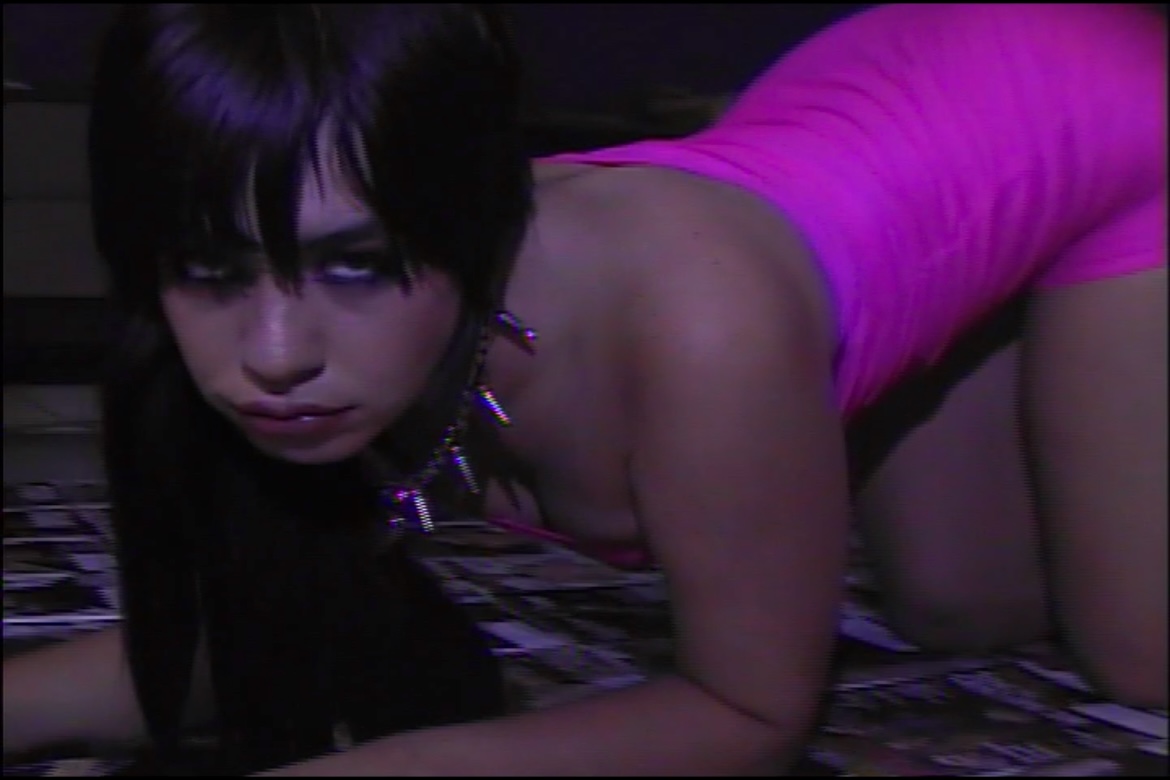
“I think I was always queer, but it took me a long time to figure out how. I’m pansexual, but [I wondered] if that made me queer. Growing up, I didn’t like being subscribed to lo que es ser una mujer. Still, you want to be attractive. There’s a whole performance, and I don’t know if I’ve ever been good at doing anything that I don’t believe in. My non-binary identity was a relief to me.”
“Yo quiero abrazar a todo el mundo. Anyone comes to me and they fuck with my music for whatever reason – I fucking love you,” says Nebreda. “I think that’s my ethos as a whole persona. I want all the bitches: la que se sabe vestir y la que no se sabe vestir, the one that’s trying to be a better person and rethinking their politics. I want to use love as a way of unifying cosas. I’m fed up with all the fucked up shit happening in the world right now. I’m constantly trying to be a better person and acknowledging my own privileges, while also trying to usarlos para ayudar a otra gente. This scene is very gay, queer, and trans-led – I think it’s gonna stay that way.”
The Latin Core scene Nebreda has found themself at the vanguard of is still in a nascent stage. It’s an exciting moment in the evolution of El Moviminto, a moment when the balance of power has shifted toward those who were for so long left out of the conversation. Musicians and producers like Nebreda, who honour and uplift their queerness, are the ones positioned to define what the genre looks like as the scene continues to emerge, cheekily queering reggaeton history.
With Día De Los Muertos (elsewhere, Halloween) quickly approaching, the “darks” energy is everywhere. The queers and the freaks and the goth bitches on the margins, no matter the season, find respite from societal B.S. in the dark corners of the rave, dressed in mesh, black leather, and boots. If Corazón Club, Vol. 1 and MJ Nebreda’s approach is indeed for everyone, it’s especially for those seeking to create new worlds in their sweat, the ones who play in the shadows cast by dim club lights.
“When you’re a Latina alternative girl, I think it’s very natural to be ‘darks’,” they say. “I like goth, punk, emo: when I was little I wanted to be a rock girl. It didn’t happen in quite that way, but I think I do understand my music from a punk lens. Yo estoy tratando de destruir muchas cosas, and I think a woman singing about whatever the fuck she wants is punk. That hardness intrigues me – but I’m still soft.”
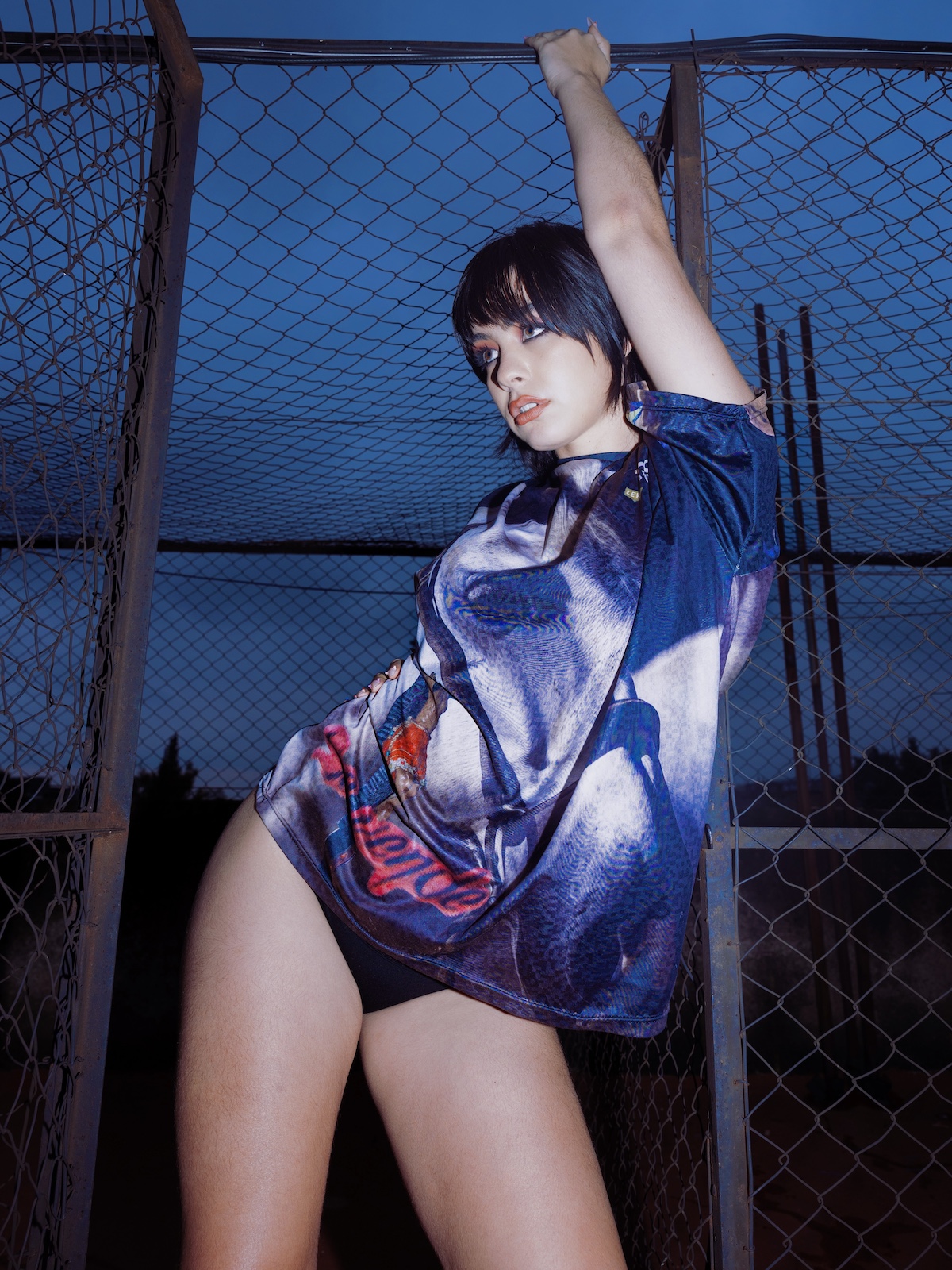
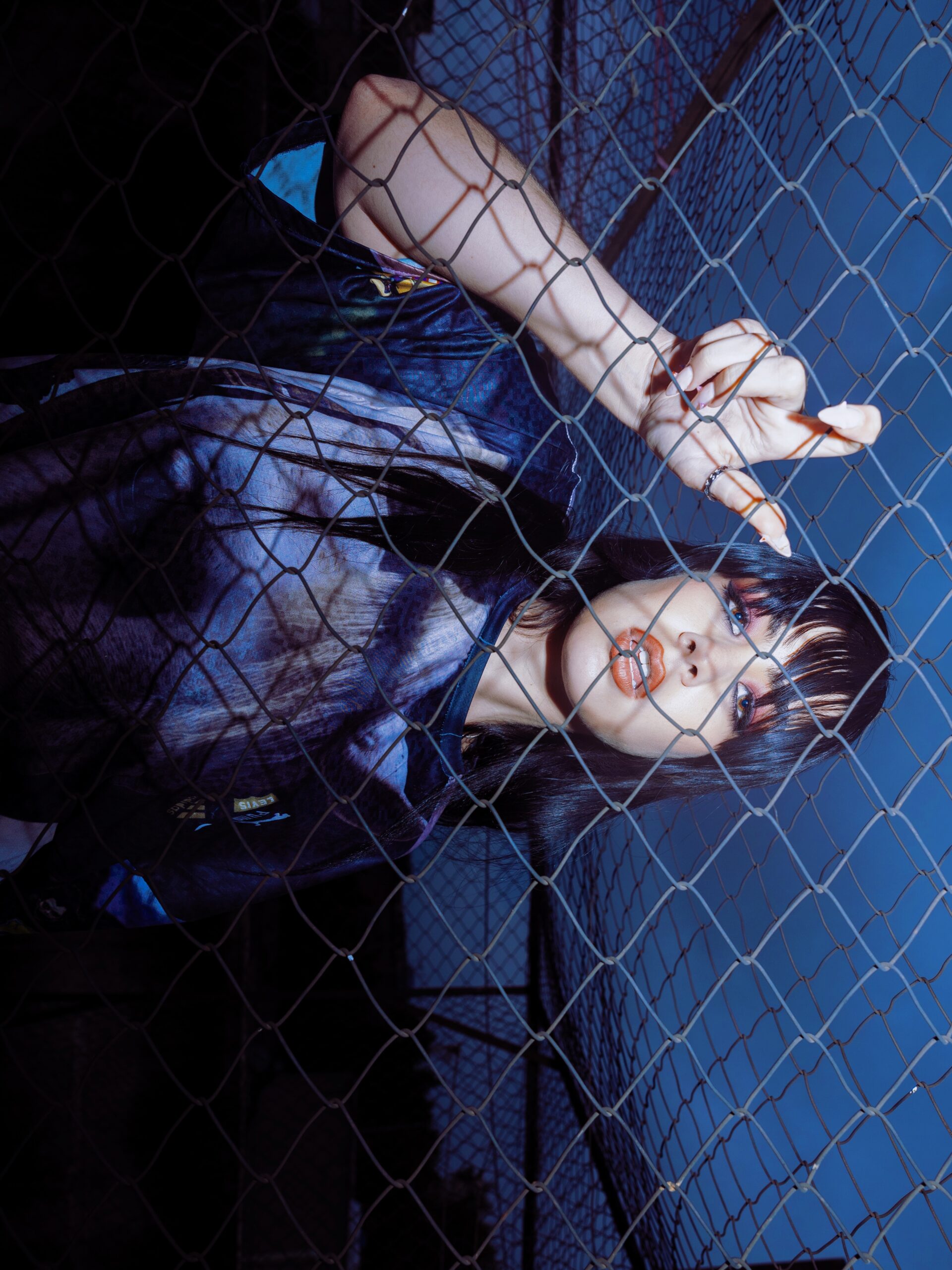
En Spanglish: MJ Nebreda on non-binary identity, su proceso, y Corazon Club, Vol. 1
Te quiero preguntar sobre el show. I really did want to go, but I had landed from Miami, and you went on at 1:30 – by midnight, I was under my covers. Was there any standout moment, beside the guy who sang Ms Nina’s “Arepa” verse at you?
I think that! But the show was really good. Había un tipo vendiendo fake merch and I loved that – my first bootleg merch moment. They were faster than me!
Did you play anything from Corazón Club Vol. 1?
I don’t like to play anything before it comes out – soy súper celosa con mi música. Unless the song is mastered and submitted, I will not put a snippet out. I’m just like ‘No one can know what I’m doing, no one can know what beats I’m into, no one can know what I’m wanting to get into’. I feel like people love snippets, but then don’t listen to the final product.
What’s your favourite song to play live?
I think “Calor” is my favourite song that I sing live because no matter what is going on with the crowd, cuando la canto it fits perfectly with any energy. It’s a shift for people: when I played “Calor”, I felt like people went to see the show por esa canción.
¿No has sacado un álbum completo? ‘Cause Corazón Club Vol. 1 is also gonna be another EP you release independently.
I’m considering this one a mixtape. I haven’t gone to the album yet. I did distributions for my first project [Sin Pensar], which I released on the label GODMODE. Pero for the most part, I’m my own record label. I’ll call something an album when I feel I have the proper backing to make it what I wanted to be. That’s the difference between a mixtape and an album, para mí – like an álbum es como a masterpiece of my work I want to share.
¿Cómo dirías que has crecido desde tu primer release, y desde Arepa Mixtape?
I think up until now, mi único motivo era crear art, hacer el mejor arte possible with the best people I can work with, becoming the best person I can become. I was just 100% focused in eso, not even thinking for a second about how I’m gonna sell myself to the world. I was thinking purely like a producer, pero a la vez tener ese momento conmigo, figure out all the songs I like to do.
With your emotional side though, the music is always danceable. It’s not quite baladas arrebatadas.
I can’t. No me sale. I’m a drummer at the end of the day. I love to explore them. I love to connect them. Bass, too. I just like making beats. I definitely like a dance beat, pero no diría que toda mi música es to dance.
¿Qué me cuentas de Corazón Club, Vol. 1? Besides this being you figuring out your sonic landscape, what is this EP for you?
I think I wanted to make un proyecto that spoke to my sense of love. I make a lot of music desde esa perspectiva. Nevertheless, I don’t feel like I’m ever gonna fit into any one perspective. Al final, I’m non-binary. I don’t believe in traditional gender, but at the same time, tengo these needs of love. Soy una persona monógama. It’s like ¿cuál es mi sexualidad, cuál es mi lado de amor, romántico, personal, emocional?
I’m seeing that kind of queer understanding of love in your work so much more clearly now. When did you come into your non-binary identity?
When I started making music. Just naturally, people I met would be like, “What are your pronouns?” I had a uniceja and I had a lot of moments where I was like “fuck trying to be this perfect-looking person.” I think growing and finding myself through my music has allowed me to realise that I’m non-binary, but I always was. I have had a lot of conversations with different non-binary people: this friend of mine came up to me and said “I’m non-binary too, but if I wore a dress I think everyone would freak out.” Being non-binary doesn’t mean I have to have short hair or whatever. I actually think a lot of the things that are “femme” are not actually gendered at all: expression, art, putting things on your face, wearing colours, wearing frilly things. Then there’s people that really don’t like having any femininity added to them. No hay como una regla de who you have to be, what pronouns you have to use: you can just be it.
La primera vez que escuché una rola de reggaeton fue antes de ser teenager en Caracas, en el carro de mi primo, que es super-hetero. When I came into myself as queer person, I still loved this music, and came to realise its new wave has a queer context that is so alive. You see it in neoperreo and Latin Core, where the big players are queer femmes and goths.
I wrote this song “Feeling Like I’m Gay” after hooking up with a girl. I use the word gay very specifically, because it wasn’t lesbian. Maybe I’m feeling like a man. Gender is a perspective. I think I was always queer, but it took me a long time to figure out how. I’m pansexual, but [I wondered] if that made me queer. Growing up, I didn’t like being subscribed to lo que es ser una mujer. Still, you want to be attractive. There’s a whole performance, and I don’t know if I’ve ever been good at doing anything that I don’t believe in. My non-binary identity was a relief to me.
¿Cuál es tu canción favorita del disco?
Ay no sé. La última [Así Nací] se trata de Venezuela. Las dos últimas, esa y “Tormenta”, las escribí en un break-up, llorando y todavía peleándome con el bicho, fumándome un porro, grabando y cantando. Como salió de ese flow, la canción quedó muy emocional para cuando estás con alguien y te hieren. The other songs are different from the two last songs. Todas las cosas están ahí, pero, yo soy una persona who lets myself be en esos momentos. Se trata de una persona, una cosa, un lugar. En mi caso soy Venezolana, y a veces te sientes inutil con todo lo que está pasando. Es un soul feeling, como también es mantener la esperanza.
On that note, your ability to connect across generations of Venezuela’s electronic underground, from DJ Babatr to Safety Trance, really stands out to me.
Cuando saqué “Feeling Like I’m Gay”, yo no sabía lo que era el raptor house, y un primo mío me dijo que era lo que estaba haciendo. Así me conecté con Baba, y me metí muy a fondo: él me mandaba vainas y le mandaba vainas pa’tras. Es así que salió “Frida Kahlo” con él y Nick León. Para mí fue muy lindo involucrarme. It made me feel like I didn’t fall out of a fucking coconut tree.
Corazón Club Vol. 1. is released on 11 November.
This interview has been edited and condensed for clarity.
The post MJ Nebreda is partying with her demons appeared first on GAY TIMES.
Go to Source
Author: E.R. Pulgar
